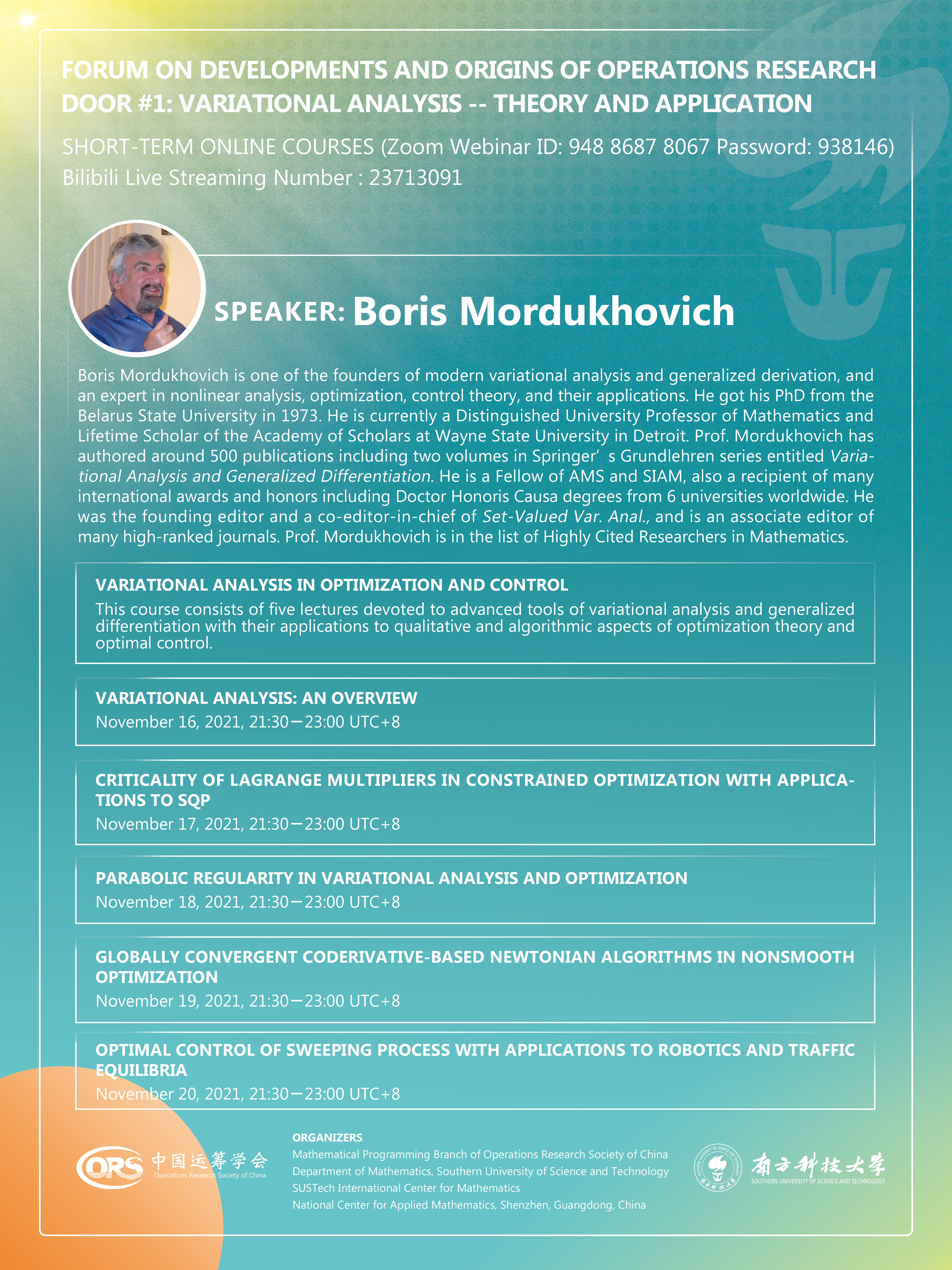Forum on Developments and Origins of Operations Research
Variational Analysis -- Theory and Application (short-term online courses) Feb 10-Dec 10, 2021
Topic IV (11.15 -- 11.21)
Speaker:Boris Mordukhovich (Wayne State University)
Boris Mordukhovich is one of the founders of modern variational analysis and generalized derivation, and an expert in nonlinear analysis, optimization, control theory, and their applications. He got his PhD from the Belarus State University in 1973. He is currently a Distinguished University Professor of Mathematics and Lifetime Scholar of the Academy of Scholars at Wayne State University in Detroit. Prof. Mordukhovich has authored around 500 publications including two volumes in Springer’s Grundlehren series entitled Variational Analysis and Generalized Differentiation. He is a Fellow of AMS and SIAM, also a recipient of many international awards and honors including Doctor Honoris Causa degrees from 6 universities worldwide. He was the founding editor and a co-editor-in-chief of Set-Valued Var. Anal., and is an associate editor of many high-ranked journals. Prof. Mordukhovich is in the list of Highly Cited Researchers in Mathematics.
Materials
VARIATIONAL ANALYSIS: AN OVERVIEW
CRITICALITY OF LAGRANGE MULTIPLIERS IN CONSTRAINED OPTIMIZATION WITH APPLICATIONS TO SQP
PARABOLIC REGULARITY IN VARIATIONAL ANALYSIS AND OPTIMIZATION
GLOBALLY CONVERGENT CODERIVATIVE-BASED NEWTONIAN ALGORITHMS IN NONSMOOTH OPTIMIZATION
OPTIMAL CONTROL OF SWEEPING PROCESSES WITH APPLICATIONS TO ROBOTICS AND TRAFFIC EQUILIBRIA
Recordings (in Bilibili)
https://space.bilibili.com/1254993141/
Topic: VARIATIONAL ANALYSIS IN OPTIMIZATION AND CONTROL
This course consists of five lectures devoted to advanced tools of variational analysis and generalized differentiation with their applications to qualitative and algorithmic aspects of optimization theory and optimal control.
Variational Analysis: An Overview
November 16, 2021, 21:30--23:00 UTC+8
This lecture contains a brief overview of basic principles and constructions of variational analysis and generalized differentiation with reviewing some underlying results and areas of applications. In particular, we axiomatically define subdifferentials of nonsmooth functions and normal to closed sets with their major realizations, present the extremal principle and its applications to generalized Lagrange multiplier rules, and formulate necessary optimality conditions for general problems of optimal control.
Criticality of Lagrange Multipliers in Constrained Optimization with Applications to SQP
November 17, 2021, 21:30--23:00 UTC+8
This lecture is devoted to a new theory of critical and noncritical Lagrange multipliers for general problems of constrained optimization, including conic programming. Using advanced machinery of variational analysis, a generalized differentiation, we present second-order characterizations of critical and noncritical multiplies with their applications to the sequential quadratic programming method (SQP) in problems of constrained optimization.
Parabolic Regularity in Variational Analysis and Optimization
November 18, 2021, 21:30--23:00 UTC+8
In this lecture we discuss some basic notions of second-order variational analysis that are revolved around the concept of parabolic regularity for functions and sets. This general second-order regularity concept plays a fundamental role in deriving a variety of second-order calculus rules for primal and dual constructions of generalized differentiation and their applications including necessary and sufficient optimality conditions for various problems of constrained optimization, uniform growth conditions for augmented Lagrangians in conic programming, etc.
Globally Convergent Coderivative-based Newtonian Algorithms in Nonsmooth Optimization
November 19, 2021, 21:30--23:00 UTC+8
This lecture is devoted to applications of second-order variational analysis and generalized differentiation to the design and justification of novel generalized Newtonian algorithms. We present coderivative-based versions of the damped Newton method and of the Levenberg-Marquardt method designed via the generalized Hessian. Efficient conditions for the global convergence of these algorithms are obtained for problems of convex composite optimization with establishing their superlinear convergence rates and applications to Lasso problems.
Optimal Control of Sweeping Process with Applications to Robotics and Traffic Equilibria
November 20, 2021, 21:30--23:00 UTC+8
The final lecture of this course is devoted to applications of variational analysis to a new and challenging class of optimal control problems for the so-called sweeping processes, which are governed by discontinuous differential inclusions, dynamic variational inequalities. We develop the method of finite-difference/discrete approximations to the study of such problems and then derive in this way necessary optimality conditions for discrete-time and continuous-time systems with applications to some models of robotics and traffic equilibria.
